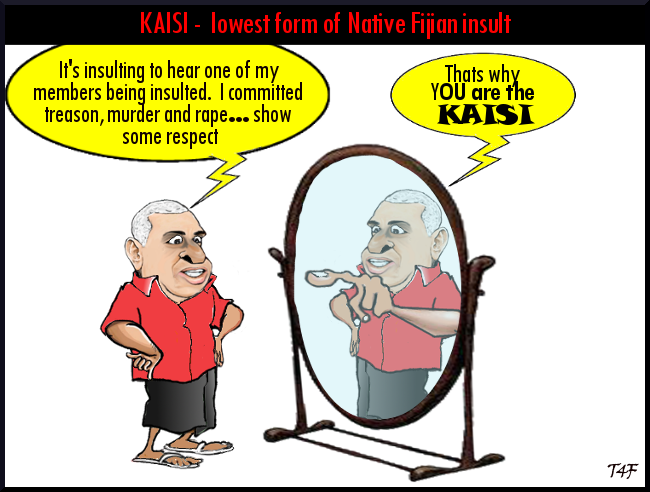HISTORY repeats itself. Shortly after the bitterly fought 1982 general election, Apisai Tora claimed in Parliament that the action of the NFP in the then election was a show of arrogance (viavialevu) and insults heaped on the Fijian chiefs could only be made by people belonging to the lowest caste (kaisi bokola botoboto). An NFP parliamentarian, Jai Raj Singh, protested against the Fijian terms used by Tora, but the Alliance Speaker Tomasi Vakatora (who earlier had defeated the FNP leader Sakiasi Butadroka in his Rewa constituency) overruled the objection, saying the words had been used in the Fijian Parliament. Excerpted from Victor Lal, Fiji: Coups in Paradise - Race, Politics and Military Intervention
Now, thirty three years later, WHO said "Kaisi" in the Fijian Parliament?
Fred Wesley, Fiji Times
Wednesday, February 11, 2015
THE Prime Minister Voreqe Bainimarama appeared riled about an insult he said was levelled at an MP in Parliament yesterday.
Chiefly titles, he said, and insulting remarks should be kept outside Parliament.
He was responding to an alleged derogatory remark made from the Opposition bench at yesterday's parliamentary sitting.
It obviously pricked a nerve in the PM and he warned members of Parliament to be careful with what they say.
"It's very insulting to hear one of our members being insulted from across the room from that side with the iTaukei insult 'kaisi'," he said.
He believes such insulting remarks were not good for the House because it did not augur well for the relationship they wanted to establish in Parliament for the people of Fiji.
Speaker of Parliament Dr Jiko Luveni endorsed the PM's sentiment, urging MPs to adhere to the rules of Parliament.
Chiefly titles, the PM said, had no place in the Parliament.
"That's nothing. Worse things have been said in Parliament by the PM himself," Opposition leader Ro Teimumu Kepa retorted.
Opposition member Roko Tupou Draunidalo insisted members on the Opposition bench were not "cry-babies" to report on petty issues.
Under the Constitution, every member of Parliament, and anyone else speaking in the House, has (a) freedom of speech and debate in Parliament or its committees, subject to the standing orders; and (b) parliamentary privilege and immunity in respect of anything said in Parliament or its committees.
However, Parliament may prescribe the powers, privileges and immunities of members of Parliament and may make rules and orders for the discipline of members.
Given the attention taken up by the interjections in Parliament yesterday, and the alleged insult raised by the PM, one would hope the focus is not diverted away from the important issues before our representatives.
Clearly there are many issues of national interest and questions before Parliament.
This is the place where such issues should be raised and discussed, and hopefully bring about some sort of closure or answers, and solutions.


